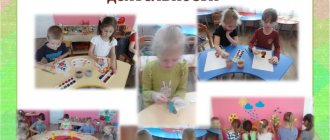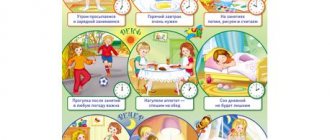Instilling in preschoolers a love for their native land
Venera Masalimova
Instilling in preschoolers a love for their native land
Instilling in preschoolers a love for their native land
Masalimova V.V.
MADOU Kindergarten No. 9 “Alyonushka”
, Birsk city
What attractive force lies in what surrounds us since childhood? Even after leaving his native place for many years , a person remembers them with warmth and constantly proudly tells the guest about the beauty and wealth of his native land . I think this is an expression of deep affection and love for everything that has entered the heart as the most precious from an early age. Adults pass on their love for their native places , their idea of what they are famous for, what nature is like, what kind of work people do - all this is passed on to children.
The main source of impressions of preschoolers is their immediate environment, the social environment in which they live. Not everything that surrounds a child is educationally . Therefore, the correct choice, from my point of view, of objects that children should be told about is very important.
Every corner of our country is unique. One city has many plants, factories, tall buildings, wide avenues, the other is famous for its past, ancient monuments. One village stands on the banks of a large river, and another is located in the remote taiga, the third is located in the steppe or on the seashore. Each locality has its own artists, athletes, painters, poets, advanced workers. Preschoolers should have an idea of the heroes of the Civil and Great Patriotic Wars who defended their native land .
In the older age group, it is already possible to organize work in such a way that each student is imbued with the glory of their native land and feels involved in local social events.
However, it would be wrong to introduce children to their native land to limit themselves to showing only its features. In this case, preschoolers may not have a correct idea of their native land as part of the large country in which they live - Russia. It must be emphasized that no matter how special the native land , it certainly reflects what is typical and characteristic of the entire country:
— here, as elsewhere in the country, people work. They work for the good and happiness of everyone, are always ready to help each other; their work, like the work of all people, is honorable;
- in the hometown , district, village, as in other places, folk and military traditions : honoring the memory of fallen heroes, seeing off recruits to serve in the Army, traditionally honoring labor veterans, celebrating harvest day, etc.;
-here, as throughout the country, they take care of children;
- people of different nationalities can live in their native land , their joint work, friendship, mutual assistance becomes an illustration of the fact that in our country, as in a single family, people of different nationalities live;
-here, as throughout the country, people must take care and protect nature.
So that children, having learned some specific facts, observing the life around them, can, through simple analysis and generalization of impressions, better imagine that their hometown or village is part of the country, one of many similar to it, it is necessary to give them some initial information from the history of the country, republics - talk about what they cannot see in their immediate environment. In this case, you should focus on the education program in kindergarten .
In accordance with the program of education and training in kindergarten, taking into account local conditions, age and individual characteristics of children, the teacher plans all educational material evenly over time, so that children acquire knowledge gradually over the course of the year, in a certain system.
It is most advisable to plan material by topic. Broad, voluminous topics correspond to the content of the program: “My Bashkortostan”
,
“Nature
of the native land ” ,
“In a united family”
,
“About the work of people”
, etc. Work on each topic includes activities, games, work, free activity of children, and on some topics - holidays.
Studying the native land makes a certain contribution to the development of independent thinking, memory, and imagination of the child. The beauty of the native land , national life, and art are a powerful source of a child’s mental development, a means of humane, moral and aesthetic education .
The task of every teacher is to awaken the child’s soul and develop the abilities inherent in him by nature.
The need to involve the family in the process of familiarizing preschoolers with the social environment is explained by the special pedagogical capabilities that the family has and which cannot be replaced by a preschool institution . The position of the parents is the basis for the family education of the child .
Everyone knows that the Motherland begins with one’s home , street, city, village. Studying with your children the places where you live, you like to walk along familiar streets, and knowing what they are famous for is a task that is quite within the capabilities of any family. Parents can also be advised such forms of involving children in public life as walks and excursions to get acquainted with historical places, monuments to fallen soldiers, visiting a local history museum, etc.
The family is the child’s first collective and in it he should feel like an equal member. Gradually, the child understands that he is a part of a large team - a kindergarten, a school, and then our Republic, our country. The social orientation of actions gradually becomes the basis for the education of civic feelings , the ability to love one’s native land , country, the ability to protect nature, and become familiar with the culture of one’s native land .
Literature:
1. How to teach children to love their homeland: A guide for educators . Comp. Yu. E. Antonov. M.: ARKTI, 2003.
2. Aleshina N.V. Patriotic education of preschool children . M.: TsGL, 2005.
3. Aleshina N.V. Introducing preschoolers to their hometown and country (patriotic education )
.- M.: UC
“Perspective”
, 2011.
Raising love for their native land in preschool children
What attractive force lies in what surrounds us from childhood? Why, even after leaving his native place for many years, does a person remember them with care, with pride about the beauty and wealth of his native land? This is an expression of deep love for everything that has entered the heart as the most precious from an early age.
Adults pass on their love for their native places, knowledge of what their native land is famous for, what its nature is, what kind of work people do, to children. This feeling of patriotism is so multifaceted in its content that it cannot be defined in a few words. This is love for the Motherland, for one’s native places and pride for one’s people, and the loss of one’s inseparability with everything around us, and the desire to preserve and increase the wealth of one’s country, the region in which we, each of us, live. Patriotism manifests itself not only in difficult, difficult life situations, but also in the everyday work and everyday life of the people.
The essence of patriotic education is to sow and cultivate in a child’s soul the seeds of love for the native nature, for the native home and family, for the history and culture of the country, created by the labors of relatives and friends, who are called compatriots.
It is well known that at each age stage of a preschooler’s development there is its own circle of images, emotions, ideas, habits that are acquired by him, become close to him and are irreplaceable. In sounds and colors, first the world of his own family, then his own kindergarten, appears before the child. In middle age, the social environment of a preschool institution. At an older age - the world of his native city, the republic and, finally, the world of his native homeland - Russia. The central link of socialization is the humanistic upbringing of a child based on universal human values, one of which is: love for parents and family, for people, for the native place where he grew up, and, of course, for the Motherland.
During this period, those feelings and character traits also begin to develop that invisibly connect the preschooler with his people, which significantly influences his worldview.
Using public education factors
in the formation of patriotic feelings in children
Motherland, Fatherland... The roots of these words contain images close to everyone: mother and father, parents, those who give life to a new person .
Where does love come from?
Of course, from lullabies. The tenderness embedded in the melody and words awakens the baby's soul and provides psychological peace. The child develops a reciprocal feeling of affection and love for family and friends. There is a popular proverb about an evil and bad person: “He listened, lying in his cradle, not to singing, but to swearing!”, And the highlanders say: “Probably his mother did not sing over his cradle!”
Having matured a little, the child receives good wishes: “If you see a man, call him uncle, if you see a woman, call him aunt, and if you see a girl, call him sister.” This is where love for people comes from.
The power of words is incredible in human life. They say about the word: you can kill with it, you can also resurrect. Repentance, confession, oath, blessing, repentance, incantation - these are words, but they contain the highest manifestations of the human spirit. The word helps to make friends and fraternize.
By immersing a child in national life, the melody of his native speech, songs, folklore, traditions, we create a natural environment for the formation of love for his family, for his native land.
The development of speech, mastery of the richness of the native language is one of the main elements of personality formation.
Many children in our kindergarten have grandparents who live in villages and dachas in the summer. Children often go to visit them. There they observe what they are doing and get involved in feasible work. Through love for grandparents, love for villages and the work of a villager is formed.
Among the Russian people, the concept of land and bread were sacred. Much is said about work, the main content of human life, in proverbs:
Labor adorns a person.
Labor is the support of life.
Labor feeds a person.
Bread is the head of everything.
The master's work is afraid.
Children also become familiar with proverbs about their homeland:
I parted with my brother - I cried for seven years, I parted with my homeland - I cried for a century.
The homeland is the dear mother, the foreign country is the stepmother.
And the horse runs faster towards the house.
The use of proverbs and sayings in classes and in everyday life activates the child’s speech. Helps develop the ability to clearly form one’s thoughts, helps to better understand the rules of worldly wisdom.
Andrian Nikolaev said: “A person, if he remembers the main songs of his people, will never cease to be his real son.” Folk songs develop patriotic feelings and instill love for the native land. Therefore, it is necessary to pay attention to learning folk songs.
One of children's favorite folk art genres is fairy tales. When it comes to a fairy tale, we like to repeat: “The fairy tale is a lie, but there is a hint in it, a hint for good fellows.” And Ushinsky says: “Thanks to fairy tales, a beautiful poetic image grows together in the souls of children with logical thought; the development of the mind goes hand in hand with the development of fantasy and feeling. Fairy tales convey the importance of good behavior.
For example, in one fairy tale “He who does not honor the old will not see the good himself,” the moral conclusion is: you need to listen to the voice of the old, take into account their everyday experience, otherwise you will be punished. The commandment of V. M. Lomonosov “History gives the young the mind of the old” is appropriate here.
Fairy tales inspire confidence in the triumph of truth and victory over evil. Children develop a sense of optimism and respect for the elderly.
Play is one of the leading and favorite activities of children. In play, the child is bold, liberated, and expresses his thoughts and feelings. In games, children seem to do everything together: their subconscious, their mind, their imagination “work” synchronously, constantly participating in understanding and reflecting the world. Through games, the child is instilled with respect for the essential order of things, folk customs, and his rules of behavior are implemented.
Children begin to play very early, long before the Word comes into their lives: with a ray of sunshine, with toys, with their own fingers, with their mother’s hair... Thanks to games, the child learns and gets to know himself step by step. There is a saying among the people: “While you are young, frolic, play, laugh, so as not to regret later.”
Patriotic education includes solving problems not only of moral, labor, mental, aesthetic, but also physical education. After all, the future citizens of Russia must grow up strong, agile, and healthy. No wonder they say: “A healthy mind in a healthy body!”
Based on the program “I am a man” (author S.A. Kozlova), in our work we tried to draw the child’s attention to himself, to his body, his organism, to his capabilities and abilities, to teach him to evaluate and value himself, to create the prerequisites for self-education, taking care of one’s own health (this is a whole range of health measures). And on the basis of self-knowledge, we tried to develop the ability to see and understand another person, to show empathy and sympathy for people.
Group wall newspapers (slides, photos, books, etc.) help children develop love and affection for their family and close people. For example, the wall newspaper “I” (in the form of a “resume”, which used photographs of children and a story on behalf of the child – I love, my pets, my friends, my dreams...). By the first of April, a wall newspaper was published in a humorous form. Parents brought a lot of funny photos. There were also wall newspapers “Native Roots”, “Our Dads are Defenders of the Fatherland”, “We All Come From Childhood”, “Dear Mommy” (where, based on photographs, there are short stories about mothers from the words of children). In the senior group, there is a “Sunny” stand for the birthday. In the graduation group "Wishes to friends."
For Fatherland Day, the men organized a holiday: they prepared vinaigrette and baked cookies. Parents listened to a recording where children talked about their dads.
From an early age, a child learns to express feelings towards loved ones, imbued with an atmosphere of love, kindness, care, respect for family and friends, and one’s roots. Birthdays are traditionally celebrated, where the birthday people receive wonderful wishes and compliments addressed to them. Parents actively participate in our holidays and matinees. For graduation, they organized a surprise for our team - a small concert and recited very interesting poems that they had composed themselves. Thanks to the techniques we used, we were able to unite the team of parents and bring families closer together. The words of G.N. Volkov are appropriate here: “Family traditions, as it were, organize the connection of generations; the spiritual and moral life of peoples rests on them.”
Author: Rodionova Antonina Anatolyevna
teacher of the highest category
GBOU "School No. 1387"
Moscow, Moscow region
CHILDHOOD GUIDE
From work experience
«Formation of a feeling of love and respect for the small Motherland in children 3-5 years old«
Ermakova Elena Alexandrovna,
teacher,
branch "Malvina" MBDOU D/s No. 70 "Buratino",
Penza
The basic qualities of personality are formed in childhood. And the future and the fate of our country depend on what qualities we can instill and educate in children.
The love of a small child for his small Motherland begins with the relationship with the closest people - father, mother, grandfather, grandmother, with love for his home, street, city. Therefore, it is necessary to start introducing children to their small Motherland from early childhood. The feeling of the Motherland begins with admiration for what children see. It is important to introduce children to the culture of their people, since turning to heritage fosters a sense of pride and respect for the land on which you live.
Forming a feeling of love and respect for the small Motherland is an important goal of raising a preschooler.
In early and middle preschool age, children develop basic ideas about the phenomena of social life, the norms of human communication, and the ability to correctly evaluate their own actions and the actions of their peers. Children of this age are characterized by great emotional responsiveness, which allows them to develop good feelings and attitudes towards people around them, especially loved ones, and a desire to do something good for their relatives. When introducing children to kindergarten, positive emotional feelings are formed towards peers, kindergarten staff, as well as a positive attitude towards the work of adults. Through introducing children to the nature of their native land, a love for their small homeland and a caring attitude towards all living things is fostered. I divided my work on developing love and respect for my small Motherland into three areas: “Family”, “Kindergarten”, “Hometown”.
"Family"
The task of this direction is to form, specify, and enrich ideas about oneself, family members, and individual norms and rules of behavior in the family. Cultivate love and respect for your loved ones.
In my work, I conduct conversations with children: “Who do I live with,” “What does mom do at home?”, “How I help mom,” “We are helpers,” “My name.” Throughout the year, I talk about other family members - dad, brother, sister, grandmother, grandfather. Together with the children we prepare gifts for the holidays for parents and grandparents. I read folk tales: “The Three Bears”, “The Wolf and the Little Goats”, “Masha and the Bear”, nursery rhymes, jokes about family and family relationships. I use fiction: Y. Koval “Grandfather, Woman and Alyosha”, G. Satir “Book”, V. Agapov “Treasure Your Name”, I Akim “Who Who Who Is?”, L. Tolstoy “Old Grandfather and Grandson” and other. We learn poems about mom, dad, and grandmother, and introduce children to proverbs and sayings about family. I am conducting a conversation on the topic “My Family” using family photo albums. I look at albums of illustrations and photographs with the children on the topic “The work of adults in the family.” I offer children didactic games: “Who should I give what to?”, “Who needs what for work,” “What is good, what is bad? ”, “My good deeds”, “My name”, “Guests have come to us”, “Find out from the photo” I organize role-playing games “Family” with various plots. I'm going to watch cartoons.
"Kindergarten"
Task: To form and concretize initial ideas about basic rules of behavior, relationships with peers and other people. Continue to introduce children to the kindergarten, its territory, internal premises, and employees. Cultivate respect for adults.
To create a favorable, friendly atmosphere in the group, I conduct special games to bring children together: “What is your name?”, “One, two, three, say your name,” “round dance” and others. I give talks about kindergarten. I offer children to look at the plot paintings “We Play”, “Kindergarten”, “The Work of Adults in Kindergarten”. I pay special attention to the creation of collective works in the visual arts. Such activities bring children together and develop a friendly attitude towards each other. During the school year, I introduce children to the staff and premises of the kindergarten, and conduct traditional excursions: “Medical room”, “Laundry”, “Kitchen”. I conduct conversations: “Safety in kindergarten”, “Who helps us in the group?”, “Who works in kindergarten” I draw attention to the fact that adults take care of children in kindergarten. Together with the music director we conduct entertainment and holidays: “Matryoshka came to visit us”, “Autumn came to visit us”, “New Year at the gate”, “Mother’s holiday”. In joint activities with children I conduct didactic games “Every thing my place”, “Good and bad”, “What has changed?”, “My name”, “Find objects”, “I give gifts”, “I will do well and not be bad”, “Right - wrong”. I organize role-playing games “Kindergarten”. I read fiction about children and friendship. I take the children on targeted walks around the garden and observe the work of the janitor. watching older children play.
"Hometown"
Task - To form initial ideas about your hometown. its name, main streets, historical, cultural, architectural monuments.
It is difficult for young and middle-aged children to imagine what a city is. Looking at the nearest houses and the road while walking, I form the concept of “city” in children. I conduct conversations: “What house do you live in?”, “Where did I spend the weekend?”, “What did I see on the way to kindergarten?” To familiarize yourself and memorize your home address and city name, I use the game situation “The bear got lost,” “We’re going to visit.” We often look at the album “Travel Through Our Hometown”, and also use the video film “Our City-Penza”. In visual arts, I try to choose simple and easy-to-understand themes for drawing, sculpting, appliqué: “Holiday balls”, “New Year’s decorations”, “Our street”, “Golden Autumn”, “A little white snow fell”, “Spring has come”. I conduct observations in nature with children at different times of the year. We photograph all interesting changes in the area during the walk to create a group album. In my work I work closely with parents. Together with the children, I invite them to participate in photo exhibitions: “How I rested in the summer”, “Walks around the city”, “Our family traditions”, and participate in crafts and drawings competitions. I offer methodological and educational literature. The task of teachers and parents is to help a growing person discover his small homeland in what is near and dear to him in his immediate environment. This is a street and a square where the child is constantly, a yard where he plays with children, a kindergarten, which is a second home for him. All this, while the child is small, is perceived by him as an integral part of his vital environment, without which he cannot imagine his self. The feeling of the Motherland begins with admiration for what the child sees in front of him, what he is amazed at and what evokes a response in his soul.
And, although many impressions are not yet deeply realized by him, but, passed through a child’s perception, they play a huge role in the formation of personality.
Development of a sense of rhythm in preschool children Formation of knowledge about a healthy lifestyle in children 6-7 years old through didactic games Development of a sense of rhythm in preschool children through musical and didactic games Formation of the basics of safe behavior on the street in preschool children >





